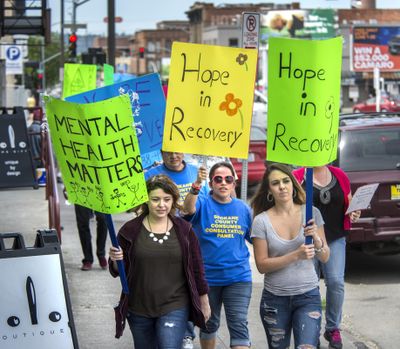Marchers take to downtown Spokane streets for mental health awareness

When Thomas Maxwell was diagnosed with a mental illness, he didn’t know whom to tell or where to go for help.
He was afraid he’d be stuck in the mental health system forever with no independence.
Maxwell, who has depression with psychotic episodes and a mood disorder, was able to get help. He was part of a small but passionate group of about 12 people who participated in Tuesday’s Jaunt in June, an event hosted by the Spokane County Consumer Consultation Panel, a group of advisers on regional services available for those with mental illnesses. The group began at the Frontier Behavioral Health building and walked a mile loop, holding signs and chanting, “Mental health matters.”
Maxwell said it was important for him to participate in this year’s march to raise awareness about mental health issues and treatment options for those who still feel alone and afraid.
Participating in the march was particularly difficult for Maxwell because he has breathing problems related to chronic obstructive pulmonary disease. But he said it was important for him to be there because he wants to help eliminate the stigma that comes with having a mental illness.
Maxwell has a job at the Evergreen Club, a clubhouse that provides support and therapy for people with mental illnesses through employment.
Dealing with a mental illness is a lifelong commitment, said Brent Smith, chairman of the consumer panel.
“Just because you’re in recovery doesn’t mean you don’t have a mental illness anymore,” he said.
It took Maxwell a couple of tries to turn things around. He realized that he couldn’t deal with his mental illness on his own. It wasn’t healthy for himself and his family, and he knew things had to change, he said.
People tend to stereotype those with mental illnesses as “just crazy” because of the way they’re associated with crime in the media, Maxwell said.
“We’re part of the solution, not part of the problem,” he said.